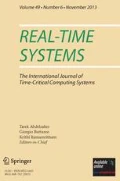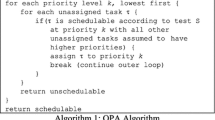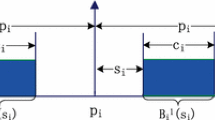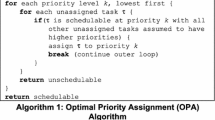Abstract
Recent results on the global multiprocessor edf scheduling of sporadic task systems are, for the most part, applicable only to task systems in which each task’s relative deadline parameter is constrained to be no larger than its minimum inter-arrival separation. This paper introduces new analysis techniques that allow for similar results to be derived for task systems in which individual tasks are not constrained in this manner. For tasks with deadlines greater than their minimum inter-arrival separation, two models are considered, with and without an implicit intra-task job precedence constraint. The new analyses yield schedulability conditions that strictly dominate some previously proposed tests that are generally accepted to represent the current state of the art in multiprocessor edf schedulability analysis, and permits the derivation of an improved speed-up bound.
Similar content being viewed by others
References
Baker TP (2003) Multiprocessor EDF and deadline monotonic schedulability analysis. In: Proc 24th IEEE real-time systems symposium, Cancun, Mexico, pp 120–129
Baker TP (2005) An analysis of EDF scheduling on a multiprocessor. IEEE Trans Parallel Distrib Syst 15(8):760–768
Baker TP (2006) Brute-force determination of multiprocessor schedulability for sets of sporadic hard-deadline tasks. Tech Rep TR-061001, Florida State University Department of Computer Science, Tallahassee, FL
Baker TP, Baruah SK (2008) Schedulability analysis of multiprocessor sporadic task systems. In: Lee I, Leung JYT, Son S (eds) Handbook of real-time and embedded systems. CRC Press, Boca Raton
Baker TP, Cirinei M (2006a) A unified analysis of global EDF and fixed-task-priority schedulability of sporadic task systems on multiprocessors. Tech Rep TR-060401, Florida State University Department of Computer Science, Tallahassee, FL. J Embed Comput, accepted
Baker TP, Cirinei M (2006b) A necessary and sometimes sufficient condition for the feasibility of sets of sporadic hard-deadline tasks. In: Proc 27th IEEE real-time systems symposium, Rio de Janeiro, Brazil
Baruah S (2004) Optimal utilization bounds for the fixed-priority scheduling of periodic task systems on identical multiprocessors. IEEE Trans Comput 53(6):781–784
Baruah SK (2007) Techniques for multiprocessor global schedulability analysis. In: Proc real-time systems symposium. IEEE Computer Society Press, Los Alamitos, pp 119–128
Baruah SK, Baker TP (2008a) Global EDF schedulability analysis of arbitrary sporadic task systems. In: Proc EuroMicro conf on real-time systems. IEEE Computer Society Press, Los Alamitos, pp 3–12
Baruah SK, Baker TP (2008b) Schedulability analysis of global EDF. Real-Time Syst 38(3):223–235
Baruah SK, Fisher NW (2007) Global deadline-monotonic scheduling of arbitrary-deadline sporadic task systems. In: Proc 11th int conf on principles of distributed systems. Lecture notes in computer science, vol 4878. Springer, Berlin, pp 204–216
Baruah SK, Fisher NW (2008) Global fixed-priority scheduling of arbitrary-deadline sporadic task systems. In: Proc 9th int conf on distributed computing and networking. Springer, Berlin, pp 215–226
Baruah SK, Mok AK, Rosier LE (1990) Preemptively scheduling hard-real-time sporadic tasks on one processor. In: Proc 11th IEE real-time systems symposium, pp 182–190
Baruah SK, Baker TP, Fisher NW (2007) The partitioned dynamic-priority scheduling of sporadic task systems. Real-Time Syst 36(3):199–226
Bertogna M, Cirinei M (2007) Response-time analysis for globally scheduled symmetric multiprocessor platforms. In: Proc 28th IEEE int real-time systems symposium, pp 149–158
Bertogna M, Cirinei M, Lipari G (2005) Improved schedulability analysis of EDF on multiprocessor platforms. In: Proc 17th EuroMicro conf on real-time systems, Palma de Mallorca, Spain, pp 209–218
Dertouzos ML (1974) Control robotics: the procedural control of physical processes. Inf Process 74
Fisher NW (2007) The multiprocessor real-time scheduling of general task systems. PhD thesis, University of North Carolina at Chapel Hill, Chapel Hill, North Carolina, USA
Fisher NW, Baker TP, Baruah SK (2006) Algorithms for determining the demand-based load of a sporadic task system. In: 12th IEEE int conf on embedded and real-time computing systems and applications, Sydney, Australia
Goossens J, Funk S, Baruah SK (2003) Priority-driven scheduling of periodic task systems on multiprocessors. Real-Time Syst 25(2–3):187–205
Liu CL, Layland JW (1973) Scheduling algorithms for multiprogramming in a hard real-time environment. J ACM 20(1):46–61
Mok AK (1983) Fundamental design problems of distributed systems for the hard real-time environment. PhD thesis, Massachusetts Institute of Technology, Dept of Electrical Engineering and Computer Science, Cambridge, MA
Phillips CA, Stein C, Torng E, Wein J (1997) Optimal time-critical scheduling via resource augmentation. In: Proc 29th annual ACM symposium on theory of computing. ACM, El Paso, pp 140–149
Srinivasan A, Baruah S (2002) Deadline-based scheduling of periodic task systems on multiprocessors. Inf Process Lett 84:93–98
Author information
Authors and Affiliations
Corresponding author
Additional information
This is an extended version of the ECRTS’08 paper (Baruah and Baker 2008a), with a more precise analysis, leading to a tighter schedulability test.
Supported in part by the National Science Foundation under Grants No. CSR-0509131, CNS-04808996, CCF-0541056, and CCR-0615197, ARO Grant No. W911NF-06-1-0425, and funding from IBM and the Intel Corporation. An abbreviated version of this paper was presented at ECRTS 2008 (Baruah and Baker 2008a). The additions in this paper include several improvements to the analysis, which yield new schedulability bounds, and an answer to a question raised by the audience at the ECRTS meeting, concerning the effect of relaxing implicit precedence between successive jobs of each task.
Rights and permissions
About this article
Cite this article
Baker, T.P., Baruah, S.K. An analysis of global edf schedulability for arbitrary-deadline sporadic task systems. Real-Time Syst 43, 3–24 (2009). https://doi.org/10.1007/s11241-009-9075-8
Published:
Issue Date:
DOI: https://doi.org/10.1007/s11241-009-9075-8




